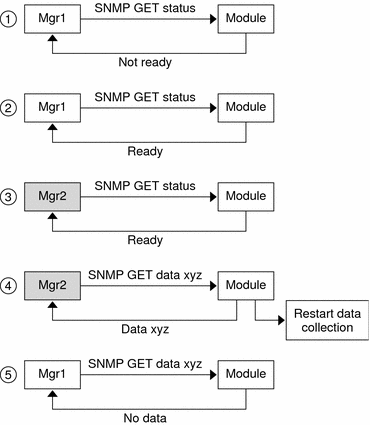Avoiding a Race Condition When Polling
A race condition can occur with two or more management applications. When multiple applications issue GET or SET protocol operations that span more than a single PDU, competition for the results occurs. In the case of a long-running data collection, a race condition can occur when the module completes data collection. The module updates the status variable to indicate that the data is ready to send. However, the agent issues a second GET operation on the same variable before the first request receives the requested data. If the module starts a new data collection in response to the second request, no data is available to return to the first request.
In the following figure, Mgr2's request is received by the module after Mgr1's request but before Mgr1 gets the data. This situation could happen if the module starts a new data collection while requests are pending.
Figure 8–1 Race Condition When Polling for Data

To avoid this scenario, a module can define a flag to maintain the state of outstanding requests. When an SNMP request is received, the module checks the flag. The module starts a new collection only if no SNMP requests are outstanding. The module returns an SNMP error if requests are outstanding.
- © 2010, Oracle Corporation and/or its affiliates
